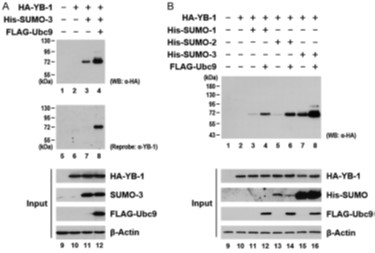麥如村助理教授研究團隊發表研究成果於 Am J Cancer Res
連結網址:https://pubmed.ncbi.nlm.nih.gov/36628281/
Abstract
Numerous reports indicate that enhanced expression of Y-box binding protein-1 (YB-1) in tumor cells is strongly associated with tumorigenesis, aggressiveness, drug resistance, as well as poor prognosis in several types of cancers, and YB-1 is considered to be an oncogene. The molecular mechanism contributing to the regulation of the biological activities of YB-1 remains obscure. Sumoylation, a post-translational modification involving the covalent conjugation of small ubiquitin-like modifier (SUMO) proteins to a target protein, plays key roles in the modulation of protein functions. In this study, our results revealed that YB-1 is sumoylated and that Lys26 is a critical residue for YB-1 sumoylation. Moreover, YB-1 was found to directly interact with SUMO proteins, and disruption of the SUMO-interacting motif (SIM) of YB-1 not only interfered with this interaction but also diminished YB-1 sumoylation. The subcellular localization, protein stability, and transcriptional regulatory activity of YB-1 were not significantly affected by sumoylation. However, decreased sumoylation disrupted the interaction between YB-1 and PCNA as well as YB-1-mediated inhibition of the MutSα/PCNA interaction and MutSα mismatch binding activity, indicating a functional role of YB-1 sumoylation in inducing DNA mismatch repair (MMR) deficiency and spontaneous mutations. The MMR machinery also recognizes alkylator-modified DNA adducts to signal for cell death. We further demonstrated that YB-1 sumoylation is crucial for the inhibition of SN1-type alkylator MNNG-induced cytotoxicity, G2/M-phase arrest, apoptosis, and the MMR-dependent DNA damage response. Collectively, these results provide molecular explanations for the impact of YB-1 sumoylation on MMR deficiency and alkylator tolerance, which may provide insight for designing therapeutic strategies for malignancies and alkylator-resistant cancers associated with YB-1 overexpression.

